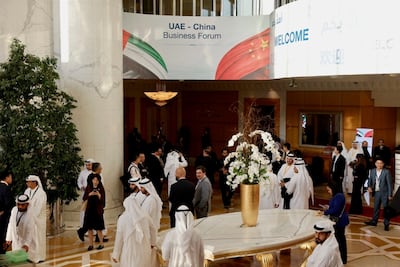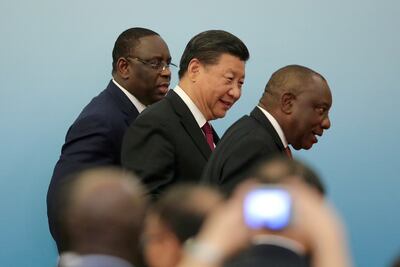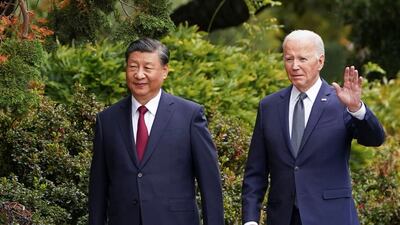Harsh words about China from the US State Department are par for the course. So when Chinese forces conducted a military exercise around Taiwan on Monday in the wake of a National Day address by the island’s President Lai Ching-te, it wasn’t entirely a surprise that State Department spokesman Matthew Miller claimed the war games were “provocations” that were “unwarranted” and risked “escalation”.
Mr Miller said they were in response to what he called “a routine annual speech”. But of course, it was nothing of the sort. Mr Lai had used the occasion to publicly announce that he would “resist annexation or encroachment upon our sovereignty” and said that “the People's Republic of China has no right to represent Taiwan”. From the point of view of Beijing, which views the island as a renegade province, that certainly constituted a provocation, as was Mr Lai’s claim a few days earlier that the island was already a “sovereign and independent country”.
Only 12 rather small countries agree with him. The rest of the world officially does not. Alluding to the fact that Taiwan is only separate from the mainland because the losing side of China’s civil war retreated to the island in 1949, one long-time participant in Asia-Pacific dialogues said to me on Tuesday night: “After the US Civil War, did the North allow part of the South to go its own way?” He added, only half tongue-in-cheek: “China’s been too soft.”
In any case, more and more countries are rejecting the western approach. Take the Gulf, for instance. On November 1, the UAE and China will mark 40 years of diplomatic ties, and there will be much to celebrate. The UAE Founding Father and first president, Sheikh Zayed bin Sultan Al Nahyan, became the first leader from the Gulf to visit China in 1990, reciprocating Chinese president Yang Shangkun’s visit to the UAE the previous year.

This laid the foundations for a relationship that has grown into a Comprehensive Strategic Partnership, with the UAE an engaged participant in China’s Belt and Road Initiative (BRI), non-oil trade between the countries reaching $81 billion in 2023, numerous initiatives aimed at building closer connections between the two peoples, and the friendship further sealed by President Sheikh Mohamed’s visit to the People’s Republic this May.
Just under two years ago, the Gulf Co-operation Council and China held their first summit in Riyadh, at which President Xi Jinping said the two sides were natural partners for co-operation and had written together a splendid chapter of solidarity, mutual assistance and win-win co-operation.

China’s ties are deepening with the African continent as well. In September the Forum on China–Africa Co-operation drew over 50 heads of government to Beijing. Mr Xi promised $51 billion in loans, investment and aid over the next three years, the upgrading of diplomatic ties, and the creation of at least one million jobs. "China and Africa account for one-third of the world population,” he said. “Without our modernisation, there will be no global modernisation." One attendee, Dennis Mwaniki from the Africa Policy Institute in Nairobi, Kenya, approved. The BRI, he told a TV reporter, was a “game changer”. The continent had come from a period of underdevelopment that put Africa “on the menu”, as he put it – but the BRI had made it “part of the table, to be making decisions as global citizens”.
Crucially, the Chinese leadership is listening and responding to what the continent’s leaders are telling them about the kinds of investments that will help them best. As Linda Calabrese of the UK’s Overseas Development Institute wrote in an analysis just after the forum: “In 2021, Xi introduced the concept of 'small and beautiful' projects better targeted at the partner country’s needs – a concept he repeated at the recent summit. It is this alignment with the requests of African leaders that differentiates China’s engagement with Africa from that of the West.”
So what of the West? There used to be politicians who were positive about relations with China. In 2012, the Princeton academic Aaron Friedberg wrote in these pages that there was in Washington “a loosely integrated pro-engagement ‘lobby’ whose members favour preserving good relations with China at almost any price”. At the same time, then UK prime minister David Cameron was still talking of a “golden era” of ties with China, and as late as 2015 took Mr Xi for a pally drink in an English countryside pub.
But if there is still a “pro-engagement lobby” in the US it has gone extremely quiet, and my own view – that we should all work with China, peacefully and for mutual benefit – has apparently been completely excluded from the political mainstream in the UK. It seems to have become an article of faith that Beijing is not just a competitor but also a threat – although to whom or to what is never adequately explained.
There could be all sorts of reasons for this change in attitudes, too many to go into here. But I wonder if Mr Mwaniki has put his finger on one of them. In the Gulf, Africa, South-East Asia and beyond, many are more than happy to share the table with China. No one in Europe and North America would be as crass as to say they preferred the situation in the 19th century, when China and the Global South were all on “the menu” as far as some predatory western powers were concerned. But they seem reluctant to draw up a chair.
Perhaps their worries about China’s great strides in the technologies of the future mean they fear ending up on “the menu” themselves. I can’t see it happening soon, but there is time to change their minds, if only they can see what the rest of the world can – that there is plenty of room “at the table” for all.


